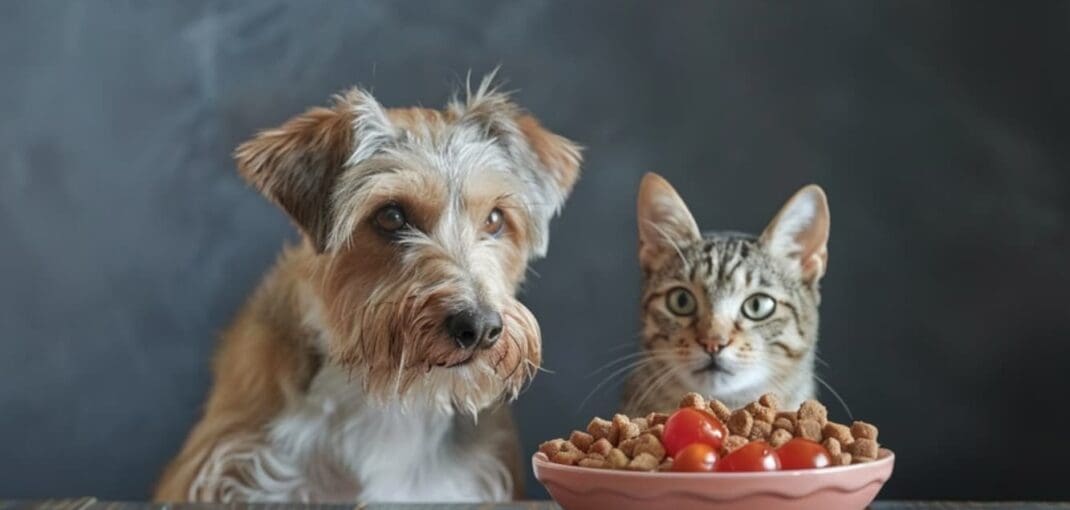More and more pet guardians are facing the challenges posed by pet food allergies and digestive problems in their pets. One solution that is gaining popularity is a mono-protein diet for the dog or cat. This diet is based on a food containing a single source of protein, thus reducing the risk of allergies and improving the pet’s overall wellbeing.
A mono-protein diet for your dog or cat is an ideal option for pets that struggle with food sensitivities. By limiting the ingredients in the food, you can better control what your pet eats and also support the health of their digestive system.
The use of single-source protein foods is recommended in cases of suspected food allergies or as part of an elimination diet. This choice can bring many benefits to both dogs and cats, helping to improve their quality of life.
What is a mono-protein diet? Definition and application
A mono-protein diet, also known as a monoprotein diet, is based on feeding animals food containing only one source of protein. For example, a mono-protein diet for a cat may be based on turkey or veal meat only. Such a solution allows close monitoring of the animal’s reaction to a particular ingredient, which is particularly important in the case of food allergies and intolerances.
An animal food with a single source of protein eliminates the risks posed by mixtures of different types of meat. This makes it possible to determine more accurately whether an ingredient is safe for your pet. A monoprotein dog or cat food is particularly suitable for an elimination diet, which helps to identify the allergens that cause reactions.
Monoprotein diets are used in both dogs and cats. It is a recommended solution for food allergies in animals. Noteworthy, a mono-protein diet for a dog or cat is also a good choice when the animal has a sensitive digestive system or eagerly eats only one type of meat.
What are the advantages of mono-protein food for dogs and cats?
Mono-protein dog or cat foods do not contain additional ingredients that could cause allergic reactions. This makes them more predictable and safe for pets with delicate digestive systems.
The benefits of mono-protein diets for cats and dogs include:
Easier management of elimination diets to identify the allergen.
Reduced risk of allergic reactions due to elimination of potential allergens.
Improved digestion and absorption of nutrients, especially in animals with sensitive stomachs.
Specialised foods for allergic dogs and cats are often based on non-traditional proteins such as lamb, duck or fish. Such sources are less taxing on the body and are less likely to cause allergies.
When is it appropriate to introduce a mono-protein diet in an animal?
The use of a mono-protein diet in a cat or dog is particularly advisable in situations where the animal suffers from food allergies or intolerances. Symptoms such as itching of the skin, hair loss, recurrent diarrhoea or vomiting may be indicative of digestive problems and require an immediate response. In such cases, the introduction of an elimination diet for the cat or dog, based on a single protein source, allows the precise identification of the ingredient causing the adverse reaction.
A specific mono-protein diet for the dog or cat can also be implemented prophylactically. This works well for animals with sensitive digestive systems. For example, cats that are prone to indigestion often tolerate simple formulas based on a single protein source better. Such cat food is simply safer for the cat. It is also a good choice when recovering from illness, when the cat’s digestive system needs time to recover and requires an easily digestible, well-digested food.
When the current diet does not meet expectations, changing the feeding method of your dog or cat by switching to a mono-protein diet also seems an interesting option. If your pet is a picky eater or refuses to eat its current food for any reason, monoprotein formulas may prove more appealing and palatable. However, such a change is only worth making after consulting your vet.
How do I choose the right mono-protein food for my dog or cat?
When choosing a monoprotein food, pay attention to its composition. A good monoprotein diet for your dog or cat should be based on a single source of high-quality protein and simple, natural additives. Avoid products containing artificial colours, preservatives or cereals with low nutritional value.
When considering the choice of food, consult your vet. A specialist will help you choose the right food for your pet’s age, breed and condition. Remember that the nutritional needs of dogs and cats are different – what works for one species will not necessarily be suitable for another.
How to properly transition to a mono-protein diet?
If you are wondering how to change your cat’s or dog’s food in a safe way for your pet, be sure to consult your vet. Also, remember that such a change should always be gradual. It should take about 7-10 days to replace an existing food with a new one. This will give your pet’s body time to adapt, reducing the risk of digestive problems.
The process of switching to a mono-protein diet in a cat or dog can be divided into several stages:
For the first 2-3 days, mix the existing food with the new food in a ratio of 75% to 25%.
Then increase the proportion of the new food until you have completely eliminated the old food.
Observe your pet’s reaction – if any worrying symptoms appear, consult your vet.
Remember that food for allergic cats and dogs should be introduced with your pet’s individual needs in mind. A carefully selected diet is the key to your pet’s health and well-being.
A properly composed mono-protein diet for your dog or cat is the way to improve the quality of life for pets struggling with food allergies and intolerances. Its advantages, such as its simple composition and ease of identifying allergens, make it an increasingly popular choice among dog and cat guardians. Consult your vet and see how such a diet can help your pet.






